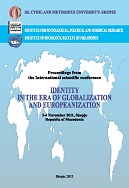
THE ATTITUDE OF THE FAR-RIGHT ORGANIZATIONS IN SERBIA TOWARDS THE RELATION BETWEEN LANGUAGE AND NATIONAL IDENTITY
THE ATTITUDE OF THE FAR-RIGHT ORGANIZATIONS IN SERBIA TOWARDS THE RELATION BETWEEN LANGUAGE AND NATIONAL IDENTITY
Keywords: far-right organizations in Serbia; national language; ethno-national consciousness; ethno-national identity
The paper presents several standpoints dealing with the relation between language and national identity adopted by the organizations typically labelled far-right in the Serbian society. Based on a research of the internet sites of those organizations, some of the standpoints examined are the following ones: a) that language, nation and the national state are tightly intertwined (one national language – one nation – one national state), b) that language and ethno-national consciousness are also closely connected (i.e. that ethno-national consciousness cannot develop without the existence of a national language), c) that children should not be taught foreign languages before they have mastered their mother tongue, and similar ones. Each of such standpoints is then approached from the perspective of linguistic theory, which not only undermines the validity of such attitudes from a scientific point of view, but also offers such an alternative to the given standpoints that affirms tolerance, the culture of peace and better understanding among members of different nations and the languages they speak.
More...